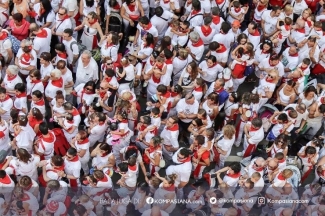THE PRODIGAL SON: LOVE, JUSTICE, AND FORGIVENESS from Luke 15:1-3.11-32
[caption id="attachment_94120" align="aligncenter" width="430" caption="The Prodigal Son."][/caption] To forgive someone is not easy. When it comes to forgiveness, many people who were treated unfairly fail to follow their conscience. Instead, they plan to take revenge on the people who have hurt them. In the film "Kill Bill", for instance, Beatrix Kiddo vows to be revenged on the people who attempted to kill her on her wedding day. Similarly, the mass media report on how Muslim radicals in some countries, including Indonesia, seem to dedicate their whole lives to terrorising Jews and westerners at all costs; even though the terrorist attack often claims the lives of the local citizens.
[caption id="attachment_94332" align="alignright" width="300" caption="Beatrix Kiddo in "Kill Bill""][/caption] Both Beatrix and the Muslim radicals believe that they are striving for justice. Indeed, justice is frequently imagined as a balance. We call it the law of equivalency, lex talionis (the law of talion): "An eye for an eye, a tooth for a tooth". In such paradigm, wrongdoers deserve but penalties. In this sense, the elder son in today’s Gospel manifests the same attitude. He labels his younger brother as the one who has swallowed up their father’s property with prostitutes. Obviously, it is opposed to his devoted observance of the father’s orders. The younger brother, then, does not deserve forgiveness at all.
Nevertheless, the concept of justice as a balance does not apply to the father’s abundant love. Instead of losing his temper, the father sees that his younger son has undergone a difficult situation and has repented. At this point, it is true that "Forgiveness does not change the past, but it does enlarge the future". I can feel how grateful the younger son would be.
[caption id="attachment_88786" align="alignleft" width="180" caption=""A Civilization of Love" by Carl Anderson"][/caption] In addition, sometimes I imagine what if our state is constituted by the principle of love. Can it work? What would the court grant the criminals: retribution or amnesty? Well, I do not have any idea about this. I do not conclude, however, that this concept will remain utopian. The same optimism is shared by a New York Times Best Seller author named Carl Anderson. He convincingly conveys a hope to build such a civilisation of love, as depicted in his book, A Civilization of Love: What Every Catholic Can Do to Transform the World. He holds that if everyone imitates God’s love in everyday routine, the need for complicated laws and governments would be greatly reduced. This idea is challenging, indeed.
Eventually, today’s Gospel invites me to reflect on two realms: the self and the state. As we pray, "Forgive us our sins as we forgive those who sin against us", I shall remind myself about one feature of love, i.e. forgiveness.[]
--The Fourth Sunday of Lent (Laetare Sunday)
Baca konten-konten menarik Kompasiana langsung dari smartphone kamu. Follow channel WhatsApp Kompasiana sekarang di sini: https://whatsapp.com/channel/0029VaYjYaL4Spk7WflFYJ2H
